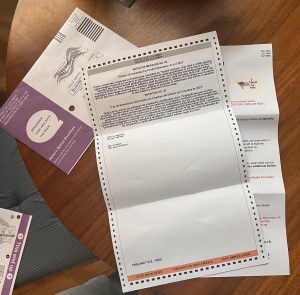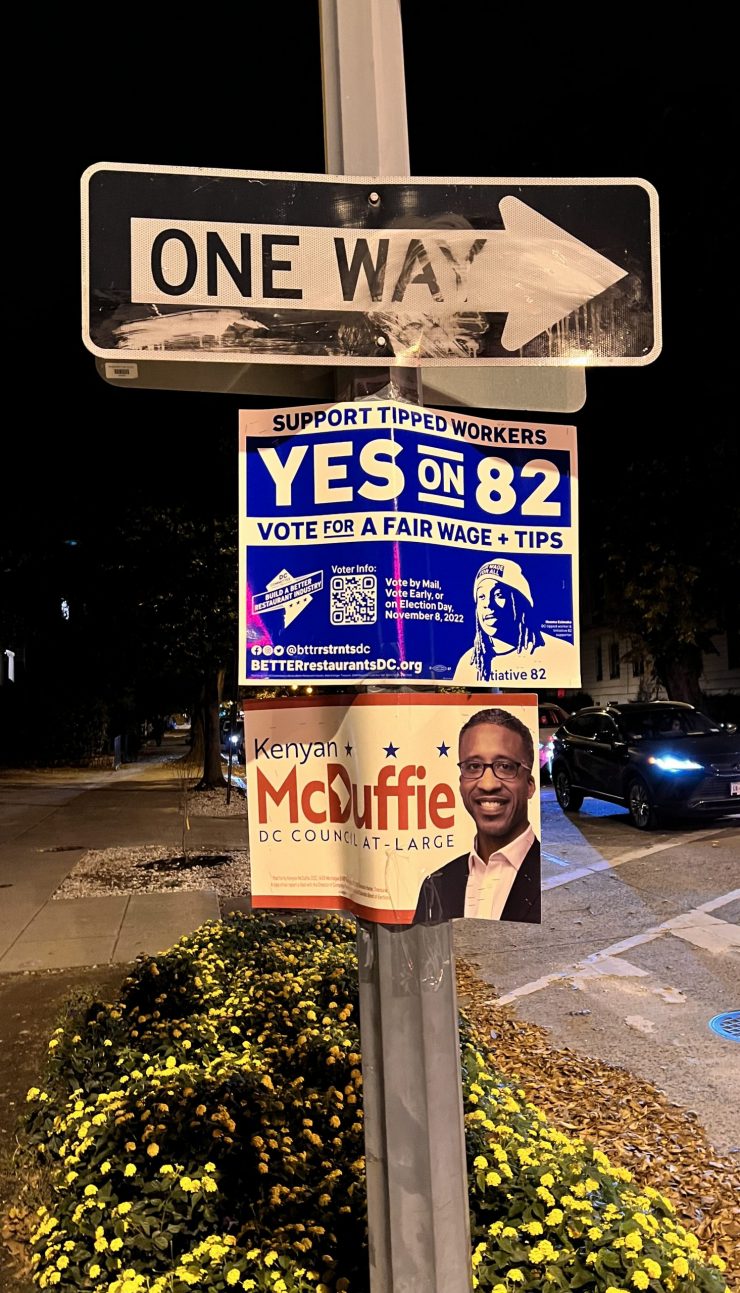D.C. voters have a decision to make this fall about the best way to adequately compensate tipped workers.
District voters initially passed Initiative 82 as Initiative 77 in June 2018 but it was later overturned by the D.C. Council. Now, the initiative is back on D.C. voters’ ballots for the November general election.
If passed, the initiative would phase out tipped wages for workers in the service industry and increase the subminimum wage until it reaches that of non-tipped workers. It would not ban bar and restaurant guests from tipping servers but would remove tips from the total of a worker’s salary. This would shift the responsibility of paying the full minimum wage of the worker back to the employer.

Currently, D.C.’s minimum base wage for tipped workers is $5.35, and $16.10 for non-tipped workers. The ballot initiative would eliminate the gap between tipped and non-tipped workers by gradually increasing the base wage.
The group behind Initiative 82, the D.C. Committee to Build a Better Restaurant Industry, is headed by current and former tipped workers. The Chairman of the Committee, Ryan O’Leary, is hopeful about the initiative’s chances of passing this time around.
“The council has radically changed in D.C.,” O’Leary told The Wash, “We have a majority of support for this initiative among the councilmembers, which we did not have in 2018.”
Besides the committee’s fundraising and organizing efforts, O’Leary spoke to other initiatives the group has undertaken in the last few years to garner support. He discussed collecting ballot signatures during the first winter of the Covid-19 pandemic and polling of tipped workers.
Wage theft is also a central talking point of O’Leary’s that he hopes the initiative will fix. He said, “The Department of Labor estimates 80%, or 4 out of 5 establishments in the country are violating wage laws; it’s just clear that the sub-minimum wage structure, if not encourages, creates the opportunity for wage theft to happen.”
While the polling showed overwhelming support from tipped workers when O’Leary’s Committee originally polled them a year ago, not everyone who earns a tipped salary is on board.
Brooke Brown is a bartender at Kramer’s and has been in the service industry for over 20 years. Brown said the pandemic flattened restaurant attendance, and the area has yet to see a resurgence. She said people are not coming out to eat as much, causing tips to go down anyway.
Kramer’s is an independent Dupont Circle bookstore with a bar and restaurant. The space also hosts events and offers local same-day book delivery.

Brown is worried that if the measure passes and the salary of tipped workers equals that of non-tipped workers, tips will go down for everyone. Brown said her understanding of it is that this would likely happen due to increased costs shouldered by restaurants raising menu costs for consumers.
Brown said the average person would likely tip 18% or lower and restaurants will have to pick up the slack.
She said, “I’m not sure I agree with tipped workers having the same wage as non-tipped workers,” but acknowledged that wages have stagnated as of late, and that a wage increase across the board would help service workers.
Brown also said that Initiative 82 could benefit servers but make less of a difference for bartenders. She explained that bartenders already make more than servers by getting tipped more per customer due to the way bartenders operate under the current system of wages. Because of this, critics like Brown say the initiative could further stagnate wages.
Other critics of the initiative believe the continual wage increase will result in higher labor costs for restaurants and bars in the area. The leading group opposing Initiative 82 (called No On 82) is backed by the Restaurant Association of Metropolitan Washington, which has financial ties to the National Restaurant Association.
Campaign finance news: Per a July filing, the No to I82 committee (which opposes a November ballot initiative to scrap the tipped wage in D.C.) raised $312k. Of that, $121k from National Restaurant Association, $40k from @FoundingFarmers group, $10k from @CarminesNYC.
— Martin Austermuhle (@maustermuhle) August 1, 2022
A review by The Wash of the D.C. office of campaign finance showed that the No on 82 campaign received nearly $180,000 in donations combined from the National Restaurant Association and the Restaurant Association of Metropolitan Washington in 2022. This figure does not include check and in-kind donations from local D.C. restaurant groups.
When The Wash reached out to No on 82 for information on its position, S-3 Group, a consulting firm with ties to the Restaurant Association of Metropolitan Washington responded with a statement from the Association’s interim director.
“Initiative 82 will negatively impact tipped employees, small businesses, and diners across the district. If passed, it would significantly limit the earning potential of DC’s tipped employees by as much as $10,000 annually.
“Restaurant owners will be forced to raise menu prices, cut staff, add service charges to checks, and potentially close altogether. Restaurant operators and tipped employees are standing together and speaking out against this measure to save our restaurant industry.” – Julie Sproesser, Interim Executive Director, Restaurant Association of Metropolitan Washington.”
In response to these and other arguments against the initiative, vocal union supporters like Local 25 are optimistic about 82’s ability to help both union and non-union workers in D.C.
Local 25 is the only union in D.C. to represent tipped workers, representing 6,500 hotel, restaurant, and casino workers in the D.C. area. Communications Director Benjy Cannon said they have formally endorsed Initiative 82 and are knocking on doors before election day to garner voter support.
Cannon said this initiative is the most straightforward way to prevent wage theft, which he said is rampant in the service industry. Carson, Like O’Leary, trusts that D.C. restaurant goers will continue to tip service workers.
“People tip for two reasons, in my opinion, directly based on the level of service they received, or just a number that they always tip by,” O’Leary said. “Americans like to tip.”















Add comment